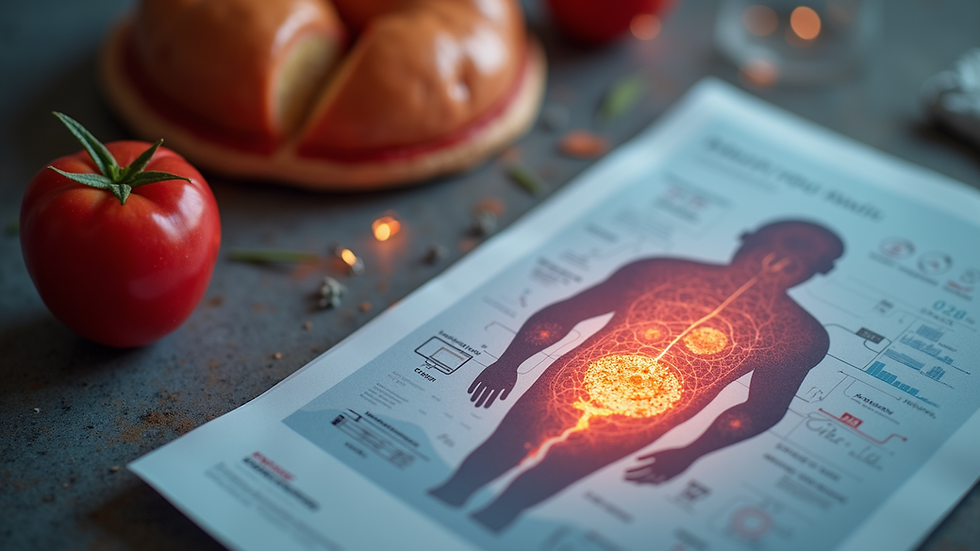Obesity-Induced Inflammation: The Hidden Link Between Physical Pain and Depression in Women
- Randa Foda
- 5 days ago
- 4 min read
Obesity is often seen solely as a physical health concern, but it carries profound implications that extend into mental health, particularly among women. As obesity rates continue to surge, we must recognize the interplay between excess weight, inflammation, physical pain, and depression. In this blog post, we will explore the scientific basis of obesity-induced inflammation, how it affects mental and physical health, and the encouragement to pursue holistic care for better overall well-being.
The Science Behind Obesity-Induced Inflammation
Obesity is characterized by an excess accumulation of fat, which can lead to a condition called metabolic syndrome. One of the most alarming aspects of obesity is the inflammatory response it triggers in the body. When fat cells (adipocytes) grow larger and more numerous, they release inflammatory cytokines—small proteins that promote inflammation. This process can lead to chronic systemic inflammation, affecting various bodily systems and contributing to both physical and psychological issues.
Inflammatory cytokines such as tumor necrosis factor-alpha (TNF-α) and interleukins (IL-6, IL-1β) are released in higher quantities in individuals with obesity. The body responds to these cytokines as if there is an ongoing infection, which can result in various health complications, including pain and mood disorders.

Moreover, obesity-induced inflammation can disrupt normal bodily functions, leading to conditions such as insulin resistance, increased blood pressure, and heightened cholesterol levels. Understanding these mechanisms is crucial for anyone addressing obesity's implications on health—both physical and mental.
The Impact of Inflammatory Cytokines on Mental Health
The relationship between inflammation and mental health is complex and multifaceted. Research has shown that inflammatory cytokines can significantly affect neurotransmitter metabolism. For instance, cytokines can alter the balance of serotonin and dopamine—two neurotransmitters crucial for mood regulation. When their levels are disrupted, it can increase the risk for depression and anxiety disorders.
Furthermore, cytokines affect neuroendocrine functions, which control hormone levels that affect mood, stress, and emotional responses. Such hormonal imbalances can further exacerbate feelings of sadness and despair, pushing some women into a cycle of depression that feels inescapable.
Inflammation also impairs synaptic plasticity, which is the brain's ability to adapt and form new connections. This alteration can impact cognitive functions such as memory and decision-making—factors that can lead to depression when they are not functioning optimally.
Empirical studies have indicated that individuals with higher levels of inflammatory markers are more likely to experience mood disorders. For example, a study published in JAMA Psychiatry found that higher TNF-α levels were associated with an increased risk of developing depression.
The Connection Between Chronic Pain, Inflammation, and Mood
Many women struggling with obesity also experience chronic pain conditions, such as fibromyalgia or osteoarthritis. The relationship between chronic pain, inflammation, and mood is intertwined. Elevated inflammation can lead to increased pain sensitivity, making everyday activities challenging and further leading to feelings of isolation and helplessness.
Chronic pain can also result in significant lifestyle changes. Individuals may start to limit physical activities, leading to a sedentary lifestyle that exacerbates both obesity and depression. This cycle of pain and inactivity can contribute to a feeling that there is no way out, creating a detrimental loop that is difficult to break.
In fact, studies indicate that nearly 50% to 60% of individuals with chronic pain also experience depression. The interplay between these factors underlines the importance of addressing both pain management and mental health in treating these conditions.

Holistic Care: A Path to Healing
While the challenges of obesity-induced inflammation, physical pain, and depression can feel overwhelming, there are pathways to healing. Pursuing holistic care that integrates medical, nutritional, and mental health support can empower women to take control of their health.
Medical Support: Consulting with healthcare professionals can provide you with guidance tailored to your specific health situations. Medications may be prescribed to manage inflammation or alleviate pain, improving overall quality of life. It's essential to discuss all symptoms, including emotional well-being, with your healthcare provider.
Nutritional Support: Nutrition plays a significant role in combating inflammation. A balanced diet rich in fruits, vegetables, whole grains, lean proteins, and healthy fats can help manage weight and lower inflammation. Foods high in omega-3 fatty acids, such as salmon and walnuts, are particularly beneficial, as well as spices like turmeric and ginger.
Mental Health Support: Seeking therapy or counseling can be a game-changer. Cognitive Behavioral Therapy (CBT) and mindfulness practices have shown promise in addressing the emotional aspects of chronic pain and obesity. Additionally, support groups can provide a sense of community and shared understanding.
Physical Activity: Incorporating regular, moderate exercise is crucial, not just for weight management but also for overall mental wellness. Activities such as walking, swimming, or yoga can improve both physical and emotional health. Start small and gradually increase activity levels to avoid injury and build confidence.
Mind-Body Practices: Engage in practices like meditation, yoga, or tai chi, which are not only beneficial for physical health but also aid in reducing stress and improving mood. These practices can help boost the body’s natural anti-inflammatory response and provide psychological resilience.
Empowering Your Journey
Understanding the connection between obesity-induced inflammation, physical pain, and depression can empower women to seek help and heal holistically. Recognizing that you are not alone in this struggle is essential. Many women face similar challenges, and the path to wellness is not linear. The integration of medical care, nutrition, mental health support, and physical activity can change lives for the better.
It takes courage to confront these issues, but with the right support, it is possible to cultivate a healthier, happier life. If you or someone you know is experiencing these challenges, I encourage you to reach out for help. Start small by making one change today, whether that’s seeking professional support, adding a healthy recipe to your meal plan, or participating in an online support group.

Final Thoughts
The journey to health can be complicated, but understanding the role of obesity-induced inflammation as a contributor to both physical pain and mental health struggles is an important step. By embracing a holistic approach to care, women can break the cycle of pain and despair, gaining tools for lasting change. Let this be the moment where you take the first step towards embracing your health and well-being—it’s time to reclaim your life.
Remember, it's not just about managing the symptoms. It's about nurturing the whole you!



Comentários